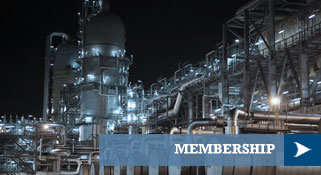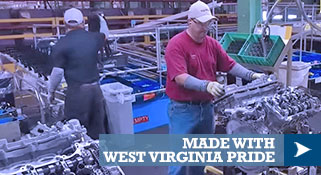- Details
 by Rebecca Randolph
by Rebecca Randolph
President, WVMA
As the President of the West Virginia Manufacturers Association, I would like to personally invite you to the third annual Marcellus to Manufacturing, M2M™ Ethane Development Conference. The conference is scheduled March 26-27, 2014 at the Charleston Civic Center. M2M™ is held in conjunction the WV Construction & Design Expo, which is the largest trade show in West Virginia with over 5,000 attendees.
The M2M™ Ethane Development Conference hosts companies interested in locating new facilities or expanding existing operations in West Virginia while providing expanded understanding of the potential for ethane and ethylene related product development in our state. Attendees learn about West Virginia’s many advantages, including tax incentives, environmental permitting, workforce development, site options and West Virginia University’s latest research related to the natural gas industry. This two-day conference offers a venue for networking with midstream, downstream and chemical manufacturing industry leaders, as well as a chance to reach out to companies interested in doing business in West Virginia.
This year the WVMA is pleased to host the first ever M2M™ Academy,a half-day educational program for West Virginia middle school students. The M2M™ Academy includes over 100 students from Jackson County middle schools.
WVMA member companies Toyota and DuPont have developed hands on demonstrations for the program, while Bridgemont Community and Technical College will provide technical demonstrations along with information about post-secondary educational programs in manufacturing. The M2M™ Academy is the first step for the WVMA in developing a more comprehensive Manufacturing Academy that aims to provide a broad overview of the diversity of manufacturing in West Virginia and the growth associated with the development of shale gas and the prospect of downstream manufacturing.
For too long, manufacturing has carried a stigma as offering jobs requiring low-skill and intense labor. Automation and technology have transformed manufacturing, altering the skills needed to operate and maintain factory equipment. Once considered “dirty jobs,” many careers in manufacturing require a high degree of skill and education, and offer earning potential to match.
According to findings from the Georgetown University Center on Education and Workforce indicates that by 2018, 42 percent of jobs in manufacturing will require some postsecondary education or a degree. In addition, a 2012 ManpowerGroup survey shows that machine operators and engineers are among the top 10 jobs that U.S. employers have trouble filling.
By most recent accounts manufacturing represents nearly 50,000 jobs in West Virginia, employing 6.6 percent of the workforce. Average annual compensation for these careers exceeds $61,000. Thanks in part to the abundance of natural gas and downstream manufacturing growth, these numbers will likely grow in West Virginia.
The West Virginia Manufacturers Association and its member companies are committed to introducing today’s students to tomorrow’s opportunities for careers in manufacturing. By partnering with the West Virginia Department of Education, The West Virginia Community and Technical College System, and West Virginia’s Four-Year universities, we can assure that West Virginia’s current and future manufacturers have a well-educated and trained workforce.
In addition to a number of quality seminar topics, day one of the M2M™conference includes a panel titled “Partnerships in Workforce Education.” The panel is moderated by Lloyd Jackson, President of Jackson Gas Company, and member of the West Virginia Board of Education. Representatives from DuPont, WVU Parkersburg, Toyota, and Bridgemont will discuss partnerships and programs in education that provide pathways for West Virginia students interested in careers in manufacturing. Mr. Jackson will also offer an update on the Board of Education’s initiatives related to the promotion of career and technical education.
No stranger to the importance of a skilled workforce, David Peebles, Vice President of Business Development for Odebrecht Braskem will provide the opening keynote address for the M2M™conference. Mr. Peebles will provide comments on Marcellus to chemical manufacturing in West Virginia and the opportunities facing West Virginia’s economy. Mr. Peebles is a founding member of Odebrecht in the U.S.A. formed in 1991.
Remember, it is not too late to register and there is no cost to attend the M2M™ Ethane Development Conference.You can register conveniently online by visiting the WVMA website at www.wvma.com and clicking on the M2M™ banner. Your registration includes the closing luncheon on Thursday, March 27, 2014, and access to seminars and the exhibit hall. You may even see a few bright-eyed students, who have learned that manufacturing is no longer just their Grandfather’s job!
- Details
 by Dennis Xander
by Dennis Xander
President, Denex Petroleum Corporation
Value added. It’s a concept that for too long has been ignored by businesses in West Virginia. However, our willingness to enhance the natural resources we produce in the Mountain State before they leave our state will determine if our promising future is simply great or truly fantastic. We clearly have the opportunity to exceed our wildest expectations. But will we make that happen?
Consider, by way of example, the furniture industry in North Carolina. Much of the hardwood it requires comes from West Virginia’s forests. The same is true for the natural resources required for the production of energy. North Carolina is geographically challenged, being quite a distance from the major consumer markets in the northeast. Despite its lack of resources and location, North Carolina has dominated the U.S. furniture manufacturing business for the last century. West Virginia has a better supply of hardwood, abundant, inexpensive energy, a quality workforce, and is located within a one-day drive of 60% of the U.S. population. But instead of manufacturing furniture, West Virginia exports its hardwood, energy and often workers to the Tar Heel State to supply its furniture industry. To add insult to injury, West Virginians purchase the furniture North Carolina manufactures, allowing potential profits to leave our state. This makes little sense.
- Details
Kevin DiGregorio
Executive Director
Chemical Alliance Zone
(304) 437-4295
kevindig@suddenlink.net
 “If someone wanted to make investments in the Marcellus shale region, how would they get involved?”
“If someone wanted to make investments in the Marcellus shale region, how would they get involved?”
That was the question posed by a member of a Canadian-based private equity firm at InformEx 2014 — a chemical industry event that includes a tradeshow, conference, and networking receptions. The gentleman was attending a talk by Tom Gellrich of TopLine Analytics entitled, “Is Your Organization Mobilized for the Shale Gas Decade?”
Fortunately, Matt Ballard of the Charleston Area Alliance and I were in the audience along with Angela Mascia, Moses Zegeer, and Joshua Jarrell of the West Virginia Development Office. Matt had set the scene earlier when he asked a question that made everyone aware that West Virginia is not only in the thick of the Marcellus area but also in the heart of the Marcellus wet gas region.
That area, located in southwestern Pennsylvania and northern West Virginia, contains not only vast quantities of methane — the main constituent of natural gas that is used for home heating and electricity generation — but also large amounts of “wet gas,” including ethane.
Importantly, ethane is a key raw material for chemical manufacturing and the starting point for all the doodads that society needs (clothing, cars, and houses) and wants (golf clubs, Keurig coffeemakers, and iPads). Ethane is converted to ethylene in a “cracker.” Ethylene is then made into a host of chemicals and plastics which are formulated into all those doodads.
The audience at InformEx knew all of that, although Gellrich explained it nicely. What they maybe didn’t know, and Gellrich didn’t note until Matt Ballard brought it up, was that West Virginia is in the midst of the shale revolution and the resulting revitalization of chemical and polymer manufacturing.
- Details
By: Karen Facemyer
President
Polymer Alliance Zone
1 Polymer Way
Davisville, WV 26142
(304) 428-1622 West Virginia’s plastics and chemical industries are becoming a major beneficiary of the shale gas boom taking place in West Virginia and the region. This topic will be underscored at the upcoming Marcellus to Manufacturing Conference (M2M Conference), taking place in Charleston on March 26-27 at the Civic Center.
West Virginia’s plastics and chemical industries are becoming a major beneficiary of the shale gas boom taking place in West Virginia and the region. This topic will be underscored at the upcoming Marcellus to Manufacturing Conference (M2M Conference), taking place in Charleston on March 26-27 at the Civic Center.
Derivatives of natural gas – ethane and propane – are used to make plastics and comprise a major piece of the industry’s cost puzzle. As feedstock prices decline due to abundant gas supplies, our plastics and chemical industries become more competitive.
One need look no further than the announcement of a potential ethane cracking and chemical processing facility to recognize the benefits our gas fields – as well as our proximity to market and skilled workforce – offer West Virginia. In fact, I view this as a transformative event that will shape our state for decades to come.
Michael Taylor, Senior Director for International Affairs and Trade at the Society of the Plastics Industry, will discuss the issues shaping the global plastics market and highlight the role low cost gas is playing in the industries resurgence when he presents at the upcoming M2M Conference.







